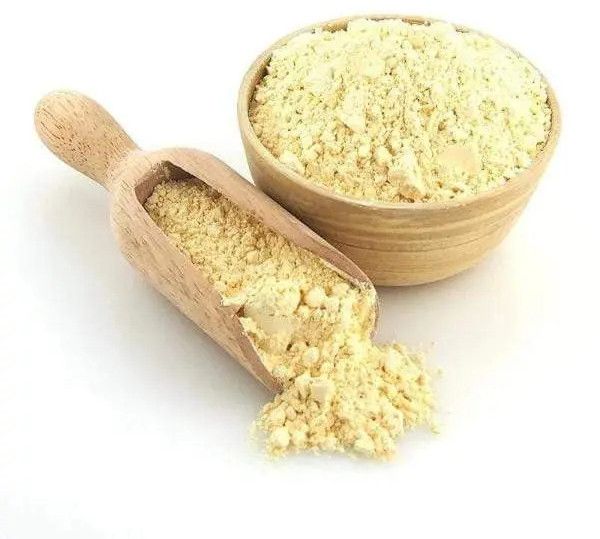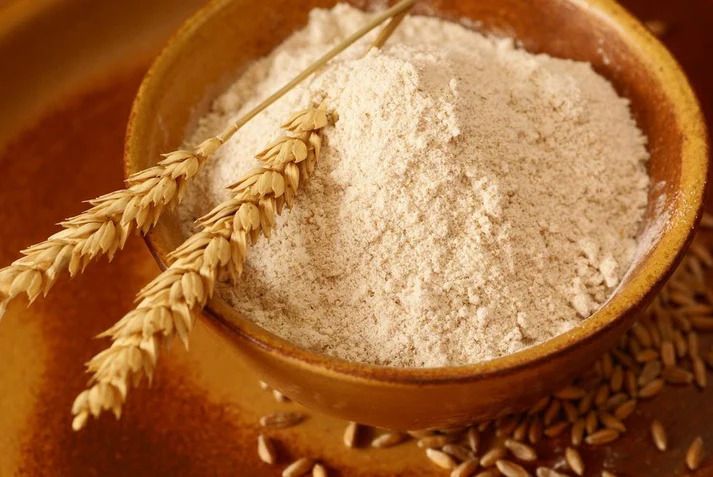- View Mobile Number
paliwalashish960@gmail.com
Flour
Leading Manufacturers, Wholesaler, Trader, Distributor of Gram Flour and Wheat Flour from Saharanpur.
| Business Type | Manufacturer, Supplier, Retailer |
| Type | Gram Flour |
| Packaging Size | 30 Kg |
| Color | Light Yellow |
| Form | Powder |
| Uses | Cooking |
| Certification | FSSAI Certified |
| Grade | 1st |
| Feature | Good For Health, Flavorful |
| Country of Origin | India |
| Brand Name | MJP Spice |
| Port | Saharanpur |
| Payment Terms | D/A, T/T |
| Delivery Time | 5-7 days |
Gram Flour (Besan) is a fine powder made from ground chickpeas (also known as gram or chana). It is a popular ingredient in many global cuisines, particularly in South Asia, the Middle East, and Mediterranean regions. Gram flour is known for its versatility in both savory and sweet dishes, and it’s an essential pantry item in many households. Overview: Type: A fine, yellow flour made from dried chickpeas (also known as chana or gram). Also Known As: Besan, chickpea flour, or garbanzo bean flour. Color: Pale yellow to golden yellow. Texture: Fine, smooth powder with a slightly gritty texture. Flavor: Nutty, earthy, and slightly sweet. Characteristics: Appearance: The flour is typically light yellow, with a smooth, slightly coarse texture, depending on the grind. Taste: Mildly nutty, with a subtle, earthy flavor, which intensifies when cooked. Aroma: A warm, slightly nutty aroma, particularly when heated or used in cooking. Nutritional Value: High in Protein: Gram flour is an excellent source of plant-based protein, making it ideal for vegetarians and vegans. Rich in Fiber: It provides a good amount of dietary fiber, aiding in digestion and maintaining gut health. Low in Glycemic Index: Being low in glycemic index, it helps in stabilizing blood sugar levels. Vitamins and Minerals: Besan is a good source of essential nutrients like Iron, Magnesium, Potassium, and B vitamins, which support overall health. Gluten-Free: Gram flour is naturally gluten-free, making it an ideal alternative for people with gluten sensitivities or celiac disease. Uses: Culinary: Gram flour is widely used in cooking to make both savory and sweet dishes. Savory Dishes: It is used to make pakoras, bhajis, bajra, and other fritters or batter-based foods. It’s also used in the preparation of dosa, cheela, and pancakes. Thickening Agent: It’s used to thicken soups, stews, and sauces in a variety of cuisines. Baked Goods: It’s an essential ingredient in many types of baked goods, such as besan ladoo (sweet chickpea flour balls), besan cookies, and cakes. Bread and Flatbreads: Used to make rotis, parathas, and other traditional flatbreads. Health and Wellness: Face Packs and Masks: Gram flour is used in skincare as a natural exfoliant. A gram flour face pack, mixed with turmeric, is used for brightening the skin, removing dead cells, and even as a mild natural cleanser. Digestive Aid: The fiber content in besan promotes healthy digestion and can help with constipation and bloating. Vegan and Vegetarian Cooking: As a plant-based protein, gram flour is used in vegan cooking to substitute eggs in recipes like vegan omelets, vegan fritters, or as a binding agent in plant-based patties. Traditional Sweets: Gram flour is essential in many traditional sweets such as besan ladoo, besan barfi, and besan halwa, where it is roasted and mixed with sugar, ghee, or other ingredients. Storage: Shelf Life: Gram flour has a long shelf life when stored in an airtight container. It should be kept in a cool, dry place away from moisture to prevent it from becoming rancid. Refrigeration: It can be stored in the refrigerator or freezer to extend shelf life, especially in humid conditions. Packaging: Typically available in both bulk packaging and smaller consumer-friendly bags. Health Benefits: Promotes Digestive Health: The high fiber content in gram flour supports healthy digestion and regular bowel movements. Supports Weight Loss: Because of its high fiber and protein content, it can help you feel fuller for longer and may aid in weight management. Rich in Iron: Gram flour is a good source of iron, which helps in preventing anemia and supports healthy blood circulation. Low Glycemic Index: Helps to manage blood sugar levels, making it suitable for diabetics. Variants: Organic Gram Flour: Available for those seeking a pesticide-free, naturally grown option.
| Business Type | Manufacturer, Supplier, Trader |
| Country of Origin | India |
| Type | Wheat Flour |
| Packaging Size | 30 Kg |
| Packaging Type | PP Bag |
| Application | Cooking |
| Certification | FSSAI |
| Grade | 1st |
| Feature | No Artificial Flavour, High In Protein, Good For Health, Organic |
| Brand Name | MJP Spice |
| Port | Saharanpur |
| Payment Terms | D/A, T/T |
| Delivery Time | 5-7 days |
Wheat Flour is a staple ingredient in kitchens worldwide, derived from grinding wheat grains. It is used to make a wide variety of foods, from bread and cakes to pasta and pastries. Wheat flour is essential for both home cooks and professional bakers, offering versatility and the structure needed in many recipes. Overview: Type: Flour made from ground wheat grains. Varieties: There are different types of wheat flour based on the milling process and protein content. The most common types are: All-Purpose Flour: A versatile flour used in a wide range of recipes. Bread Flour: Higher protein content, ideal for making bread and pizza dough. Whole Wheat Flour: Made from whole wheat grains, offering a richer flavor and higher nutritional value. Cake Flour: A finer, lower-protein flour used in delicate baked goods like cakes and pastries. Self-Rising Flour: Pre-mixed with a leavening agent (baking powder) for convenience in certain baked goods. Color: Ranges from white (for refined flour) to brown (for whole wheat flour), depending on the type of wheat and processing. Texture: Fine powder with varying levels of coarseness, depending on the type. Characteristics: Appearance: Typically off-white or pale beige for refined wheat flour; darker for whole wheat flour. Taste: Neutral, mildly nutty (especially in whole wheat flour), providing a balanced base for most recipes. Aroma: Fresh wheat aroma that enhances baked goods and other dishes. Nutritional Value: Carbohydrates: Wheat flour is primarily composed of carbohydrates, which provide energy. Proteins: Contains gluten proteins, which give dough its elasticity and texture. Fiber: Whole wheat flour is rich in fiber, which aids digestion and promotes satiety. Vitamins and Minerals: Wheat flour provides essential nutrients such as B vitamins (especially B1, B3, and B9), Iron, Magnesium, and Zinc. Gluten Content: Wheat flour contains gluten, a protein that is responsible for the structure and elasticity in dough. Uses: Baking: The most common use for wheat flour is in baking. It is used to make bread, cakes, pastries, cookies, muffins, and pancakes. Bread & Pizza Dough: High-protein wheat flour, like bread flour, is used to create strong, elastic dough that rises well. Cakes & Pastries: Softer flours like cake flour are used to produce delicate, tender cakes and pastries. Pasta: Wheat flour is a primary ingredient in making fresh pasta and noodles. Cooking: Wheat flour is used as a thickening agent in soups, sauces, and gravies. It’s also used for making batters for frying (e.g., fried chicken, tempura). Tortillas & Flatbreads: Whole wheat or refined flour is used to make various traditional flatbreads and tortillas, common in Middle Eastern, Mexican, and Indian cuisines. Coating & Binding: It is used to coat foods before frying or to bind ingredients together in dishes like meatballs or veggie burgers. Traditional Recipes: Wheat flour is essential in many cultural dishes, from naan and roti in South Asia to crepes in France and pasta in Italy. Storage: Shelf Life: White wheat flour has a long shelf life (up to a year or more) when stored in a cool, dry place. Whole wheat flour has a shorter shelf life due to the presence of oils in the wheat germ, which can cause it to go rancid faster. Refrigeration: To extend freshness, especially for whole wheat flour, it can be stored in the refrigerator or freezer. Packaging: Available in various packaging sizes, from small bags for home use to bulk packaging for industrial use. Health Benefits: Whole Wheat Flour: Higher in fiber, vitamins, and minerals compared to refined wheat flour, promoting digestive health and providing longer-lasting energy. Rich in Antioxidants: Whole wheat flour contains antioxidants, which can help reduce oxidative stress and inflammation. Supports Healthy Digestion: The fiber in whole wheat flour supports gut health and may help with digestion and maintaining healthy blood sugar levels. Health Cons



